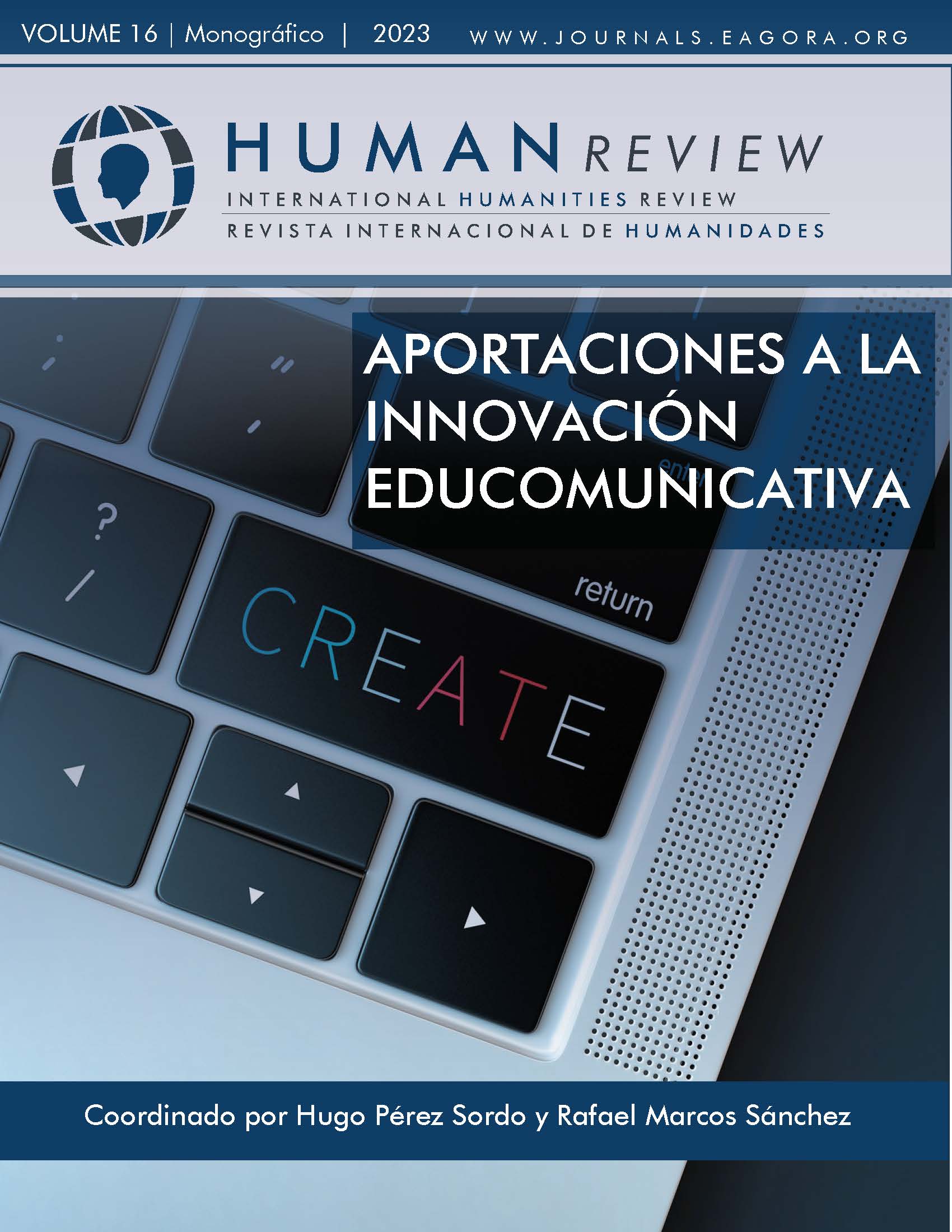Robots versus people. A business paradigm shift: ESIC University case study
DOI:
https://doi.org/10.37467/revhuman.v12.4689Keywords:
Robots, Company, Marketing, Teaching innovation, Uncertainty, Human resources, Classroom TechAbstract
This paper shows the results of a research carried out at ESIC UNIVERSITY, which consists of measuring the business impact that robotics can have. The study analyses the opinions of students after visiting and experimenting in a space equipped with robots and humanoids, called Aula Tech. It was conducted during 2018 and 2021. The study was quantitative. The sample consisted of 284 individuals, with gender parity (140 females and 139 males). The results show the total lack of knowledge of robotics in the company and the fear of social coexistence.
References
Amesti, CH. & Zardoya, N. (2021). El buen gobierno de los robots para su correcto impacto en la sociedad: ¿qué herramientas existen? Arbor, 197(802): a625. https://doi.org/10.3989/arbor.2021.802003
Bria, F. (2019). Ingreso básico y precariedad laboral en la economía de los robots. Nueva Sociedad, 279, 114-121. www.nuso.org.
Capón, J.P. (2020). El futuro del trabajo desde la óptica científica y literaria. Aequitas Virtual. Revista de la Facultad de Ciencias Jurídicas, 14(32). https://p3.usal.edu.ar › article › download
Corvalán, J.G. (2019) El impacto de la inteligencia artificia en el trabajo. Revista de Direito Económico e Socioambiental, Curitiba, 10(1), 35-51. DOI: 10.7213/rev.dir.econ.soc.v10i1.25870.
Del Rey, S. (2018). Medios autónomos de solución de conflcitoslaborales e implantación y desarrollo de las nuevas tecnologías en las empresas: algunos principios generales. En T. Duplá, Conflicto management: Nuevos modelos y herramientas de gestión eficiente de conflictos en el ámbito de la empresa (págs. 89 - 99). Editorial Aranzadi, S.A.U.
FORO ECONÓMICO MUNDIAL (2016). Informe The Global Competitiveness Report 2016-2017. https://es.weforum.org/reports/the-global-competitiveness-report-2016-2017-1/
Frey, C. B., & Osborne, M. A. (2017). The future of employment: How susceptible are jobs to computerisation? Technological Forecasting & Social Change, 114, 254–280. https://0-doi-org.bibliotecails.tec.mx/10.1016/j.techfore.2016.08.019
Hartley, J. (1999). Models of job insecurity and copping strategies of organizations. En J. M. Ferrie, Labour market changes and job insecurity: a challenge for social welfare and health promotion (págs. 127 - 150). World Health Organization.
INTERNATIONAL FEDERATION OF ROBOTICS (2021). Robot Race: The World´s Top 10 automated countries. https://ifr.org/ifr-press-releases/news/robot-race-the-worlds-top-10-automated-countries.
Kahale, D. T. (2020) “El despido de los trabajadores por la automatización de sus puestos de trabajo: ¿es posible?”, Revista de Estudios Jurídicos y Criminológicos, 2, pp. 213-231, DOI: https://doi.org/10.25267/REJUCRIM.2020.i2.08
Lacruz, M.I. (2019). Inteligencia Artificial y coches autónomos. Análisis jurídicos europeos. Revista Crítica de Derecho Inmobiliario, 95 (775): 2373-2409. https://vlex.es/vid/inteligencia-artificial-coches-autonomos-842489698
Laszlo, K., Pikhart, H., Kopp, M., Pajak, A., Malyutina, S., Salavecz, G. & Marmot, M. (2010). Job insecurity and health: A study of 16 european countries. SOC SCI MED, 70(6), 867 - 874
Mercader, J. (2017). El impacto de la robótica y el futuro del trabajo. Revista de la facultad de derecho de México, 67(269), 149 - 174. DOI: http://dx.doi.org/10.22201/fder.24488933e.2017.269.62438
MINISTERIO DE INDUSTRIA, ENERGÍA Y TURISMO (2015). Informe Industria conectada 4.0: La transformación digital de la industria Española. http://www6.mityc.es/IndustriaConectada40/informe-industria-conectada40.pdf
Montecinos, E. (2021). Cuarta revolución industrial y la administración pública en América Latina. Revista Venezolana De Gerencia, 26(93), 10-32. https://doi.org/10.52080/rvgluz93.02
ORGANIZACIÓN INTERNACIONAL DEL TRABAJO (2019). Informe Trabajar para un futuro más prometedor. https://www.ilo.org/global/publications/books/WCMS_662442/lang--es/index.htm
Pigem, J. (2018). Ángeles o robots. La interioridad humana en la sociedad hipertecnológica. Fragmenta Editorial.
Pose, B. (2018). Buenas prácticas de ADR en el sector de los seguros de defensa jurídica: modelo y eperiencia de ARAG. En T. Duplá, Conflict Management: Nuevos modelos y herramientas de gestión eficiente de coflictos enel ámbito de la empresa. (págs. 193 - 205). Editorial Aranzadi, S.A.U.
Quintero, C. (2007). La situación laboral y sindical de las mujeres en la maquiladora de México. Debate Feminista, 35, 57-82. En: http://www.jstor.org.millenium.itesm.mx/stable/42624973
Tirado, C. (2022) El informe Future of Work 2035: For Everyone to Shine. Análisis jurídico de las propuestas japonesas sobre la implantación de los robots y de la IA en el mundo del trabajo y su posible adaptación al entorno europeo, Mirai. Estudios Japoneses, 6, pp. 205-216.
Toboso, M. & Grau, M. A. (2021). Vivir con robots. Reflexiones éticas, jurídicas, sociales y culturales. Arbor, 197(802): a623. https://doi.org/10.3989/arbor.2021.802001
Trujillo Valdiviezo, G., Rodríguez Alegre, L., Mejía Ayala, D., & López Padilla, R. del P. (2022). Transformación digital en América Latina: una revisión sistemática. Revista Venezolana De Gerencia, 27(100), 1519-1536. https://doi.org/10.52080/rvgluz.27.100.15
Varela, J. (2019). Impacto de la digitalización en el empleo en España. International Journal of Information Systems and Software Engineering for Big Companies (IJISEBC), 6(1), 69-77. http://uajournals.com/ojs/index.php/ijisebc/article/view/460
WORLD ECONOMIC FORUM (2016) The Future of Jobs Employment, Skills and Workforce Strategy for the Fourth Industrial Revolution, World Economic Forum, Ginebra. https://www3.weforum.org/docs/WEF_Future_of_Jobs.pdf
Downloads
Published
How to Cite
Issue
Section
License
Those authors who publish in this journal accept the following terms:
- Authors will keep the moral right of the work and they will transfer the commercial rights.
- After 1 year from publication, the work shall thereafter be open access online on our website, but will retain copyright.
- In the event that the authors wish to assign an Creative Commons (CC) license, they may request it by writing to publishing@eagora.org









